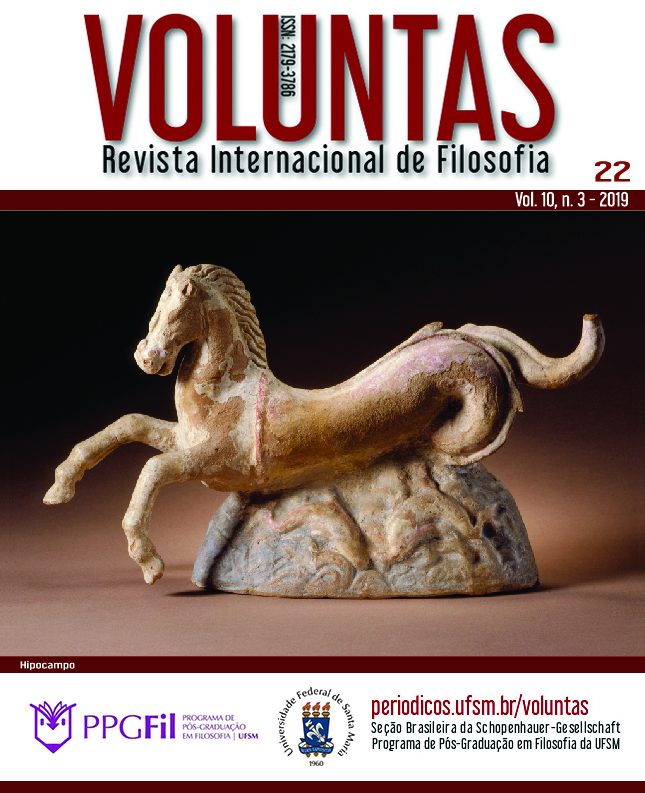Errors of memory and errors of (theory of) memory
DOI:
https://doi.org/10.5902/2179378639787Palabras clave:
Episodic memory, False Memory, ConfabulationResumen
I investigate three lab cases of memory error and test their consequences to the main theories of (declarative) memory: causal theory and simulationism. Roughly, the causal theory states that a subject remembers something only if her remembering is in a causal relation with a past experience of that thing. In simulationism, this relation is not necessary. The cases of memory error are DRM, “lost in the mall”, and memory-conjunction error. These are problem cases for the causal theory, but not for simulationism. My hypothesis is that this difficulty is because of the causal requirement.Descargas
Citas
BERNECKER, S. The Metaphysics of Memory. Springer, 2008.
BERNECKER, S. Memory: A Philosophical Study. Oxford: Oxford University Press, 2010
BERNECKER, S. A Causal Theory of Mnemonic Confabulation. Frontiers in Psychology, 8, 1207, 2017.
BERRIOS, G. Confabulations: A Conceptual History. Journal of the History of the Neurosciences, 7(3), 225-241, 1998.
BROWN, E., DEFFENBACHER, K., & STURGILL, W. Memory for faces and the circumstances of encounter. Journal of Applied Psychology, 62 (3), 311–318, 1977.
DALLA BARBA, G. Memory, Consciousness and Temporality (Neurobiological Foundation of Aberrant Behaviors). Springer, 2002.
DANTAS, D. Memória Incerta: Lembranças, Falsas Lembranças e as Ciências da Memória (dissertação de mestrado, Universidade Federal do Rio Grande do Sul), 2010.
DEESE, J. On the Prediction of Occurrence of Certain Verbal Intrusions in Free Recall. Journal of Experimental Psychology, 58, 17-22, 1959.
EVANS, G. The Varieties of Reference. Oxford: Oxford University Press, 1982.
JOHNSON, M., FOLEY, M. & LEACH, K. The Consequences for Memory of Imagining in another Person's Voice. Memory & Cognition, 16(4), 337-342, 1988.
JOHNSON, M., HASHTROUDI, S. & LINDSAY, D. Source Monitoring. Psychological Bulletin, 114(1), 3-28, 1993.
JOHNSON, M., RAYE, C., WANG, A. & TAYLOR, T. Fact and Fantasy: The Roles of Accuracy and Variability Em Confusing Imaginations with Perceptual Experiences. Journal of Experimental Psychology: Human Learning and Memory, 5(3), 229-240, 1979.
KRIPKE, S. Naming and Necessity. Cambridge, MA: Harvard University Press, 1980.
LEVINE, L. Reconstructing Memory for Emotions. Journal of Experimental Psychology: General, 126(2), 165-177, 1997.
LEWIS, D. Counterfactuals, Oxford: Blackwell, 1973.
LEWIS, D. Counterfactual Dependence and Time’s Arrow, Noûs, 13(4): 455-476, 1979.
LOFTUS, E. & PICKRELL, J. The Formation of False Memories. Psychiatric Annals, 25(12), 720-725, 1995
Loftus, E., Coan, J., & Pickrell, J. Manufacturing False Memories Using Bits of Reality. In: REDER, L. (Ed.), Implicit memory and metacognition. Psychology Press, 1996, p. 195-220.
MALCOLM, N. Memory and Mind. Cornell University Press, 1977.
MARTIN, C. & DEUTSCHER, M. Remembering. Philosophical Review, 75, 161-96, 1966.
MICHAELIAN, K. Confabulating, Misremembering, Relearning: The Simulation Theory of Memory and Unsuccessful Remembering. Frontiers in Psychology, 7, 1857, 2016a.
MICHAELIAN, K. Mental Time Travel: Episodic Memory and Our Knowledge of the Personal Past. Cambridge, MA: MIT Press, 2016b.
PEARL, J., GLYMOUR, M. & JEWEL, N. Causal Inference in Statistics: A Primer. London: John Wiley & Sons, 2016.
Rebello, J. Elementos para uma Análise do Recordar. In: FONSECA, A., POHLMANN, E. & GOLDMEIER, G. (Eds.). Ética, Política e Esclarecimento Público: Ensaios em Homenagem a Nelson Boeira. Editora Bestiário, 2012.
REICHENBACH, H. The Direction of Time. Berkeley: University of California Press, 1956.
REINITZ, M., LAMMERS, W. & COCHRAN, A. Memory-Conjunction Errors: Miscombination of Stored Stimulus Features Can Produce Illusions of Memory. Memory & Cognition, 20(1), 1-11, 1992.
ROBINS, S. Misremembering. Philosophical Psychology, 29(3), 432-447, 2016.
ROBINS, S. Mnemonic Confabulation. Topoi. Disponível em: https://doi.org/10.1007/s11245-018-9613-x, 2018. Acesso em: 22 nov. 2019.
ROEDIGER, H. & MCDERMOTT, K. Creating False Memories: Remembering Words Not Presented in Lists. Journal of Experimental Psychology: Learning, Memory, and Cognition, 21, 803-814, 1995.
SCHACTER, D. & ADDIS, D. The Ghosts of Past and Future: A Memory That Works by Piecing Together Bits of The Past May Be Better Suited to Simulating Future Events Than One That Is A Store of Perfect Records. Nature, 445(7123), 27, 2007.
TULVING, E. Episodic Memory: From Mind to Brain. Annu Rev Psychology, 53, 1-25, 2002.
WHITEHEAD, A. & RUSSELL, B. Principia Mathematica. Cambridge: Cambridge University Press, 1910.
Publicado
Cómo citar
Número
Sección
Licencia
La sumisión de los originales para este periódico implica la transferencia, por parte de autores, de los derechos de publicación impresa y digital. Los derechos autorales para los artículos publicados son del autor, con derechos del periódico sobre la primera publicación. Los autores sólo podrán utilizar los mismos resultados en otras publicaciones indicando claramente este periódico como el medio de publicación original. En virtud de ser un periódico de acceso abierto, está permitido el uso gratuito de los artículos en aplicaciones educacionales, científicas, no comerciales, desde que referenciada la fuente (por favor, vea la licencia Creative Commons en el pie de página de este periódico).






